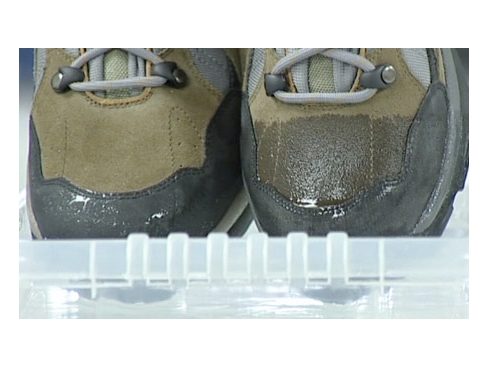Process perfected to make any item "100% waterproof"
Though nothing electronic, so far

UK company Plasma Product Innovations (P2i) has demonstrated a chemical process that it says can make absolutely any material 100 per cent waterproof.
Demonstrating what it calls an ion-masking process, which basically meant coating a trainer in some kind of solution, P2i wowed onlookers by submerging a treated shoe into a tub of water and removing it completely dry.
P2i says the individual fibres of the shoe are treated at a molecular level, so unlike current waterproofing sprays, every single part of the item is waterproofed – laces, sole, uppers, the lot.
Techradar's correspondent Philip Barker was allowed to dip a few items himself: "The non-treated products soaked up the water, especially the more porous materials such as cardboard. Those treated with ion-mask acted strangely - rather than sinking into the water we had to physically hold them under, and the water dripped straight off when lifted out again," he said.
"It was most apparent with the completely useless kitchen roll- on which water simply rested. We were actually able to make a small bowl in our hands with the kitchen roll, and none of the water dripped through at all. The way water slivered about on materials looked similar in appearance to mercury."
P2i reckons that the coating – which repels water rather than absorbing it, as Gore-Tex does, also makes the object retain all its normal qualities, too. So you can squish it or even tear it up into bits, and it'll still be waterproof.
Water great idea
Get daily insight, inspiration and deals in your inbox
Sign up for breaking news, reviews, opinion, top tech deals, and more.
Witchcraft, you say? Well, clothing and shoe manufacturer Hi-Tec has already adopted the technology (a pity, as being waterproof at a molecular level probably won't stop a uniformly rubbish trainer falling to bits), as well as the police, who are calling the process "Magnum" – probably like the gun, rather than the icecream.
But, does this leap forward in waterproofing hold any interest for us techie types? Can it actually be applied to electronics products?
"Eventually, we hope, yes," said P2i's Ian Roberts. "We are very keen to apply it to electronics, ultimately making them waterproof, although this is still in the early stages of development."
"P2i hopes to add it to various consumer items," said Philip, "But we were told it wouldn't be possible with others. The water-repellant molecules are chemically bonded to individual fibres,so it wouldn't be practical with products such as mobile phones."